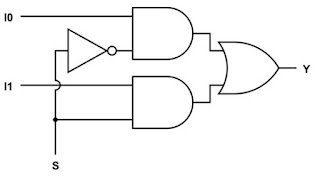Carry Lookahead 4-bit Adder Verilog
Logic Diagram for Sums
Logic Diagram for Carries
There are two important variables in Carry lookahead Adder
- Carry Generate Component Gi: It state that output carry Ci+1 is generated irrespective input carry Ci. This state occurs when both inputs Ai and Bi are 1.
- so Gi = Ai.Bi
- Carry Propagate Component Pi: It state that input carry Ci is propagated to output carry Ci+1. In other words, in this state the output carry Ci+1 is equal to input carry Ci. This state occurs when either of input is 1, other is 0. (or One input is compliment of other input).
- So Pi = Ai^Bi
- Overall equation for output carry Ci+1 = Gi + Pi.Ci (in other words, Cout = A0.B0 + (A0^B0).Cin)
- Sum = (Ai^Bi)^Ci = Pi^Ci
_________________________________________________________________________________ module Carry_Lookahead_Adder(a,b,cin,sum,cout);
input[3:0] a,b; input cin;
output [3:0] sum; output cout;
wire p0,p1,p2,p3,g0,g1,g2,g3,c1,c2,c3;
assign p0=(a[0]^b[0]), p1=(a[1]^b[1]),
p2=(a[2]^b[2]), p3=(a[3]^b[3]);
assign g0=(a[0]&b[0]), g1=(a[1]&b[1]),
g2=(a[2]&b[2]), g3=(a[3]&b[3]);
assign c1=g0|(p0&cin),
c2=g1|(p1&g0)|(p1&p0&cin),
c3=g2|(p2&g1)|(p2&p1&g0)|(p2&p1&p0&cin),
cout=g3|(p3&g2)|(p3&p2&g1)|(p3&p2&p1&g0)|(p3&p2&p1&p0&cin);
assign sum[0]=p0^cin,
sum[1]=p1^c1,
sum[2]=p2^c2,
sum[3]=p3^c3;
endmodule
_________________________________________________________________________________
Test Bench
________________________________________________________________________________
// Code your testbench here
// or browse Examples
module Adder_test;
reg [3:0] A, B;
reg C0;
wire [3:0] S;
wire C4;
integer i, f1, f2;
bit Flag; // Flag = 1 when there is error in o/p
Carry_Lookahead_Adder ADD1 (A, B, C0, S, C4);
initial
begin
f1 = 0;
f2 = 0;
Flag = 1'b0;
$display("A(hexa) B(hexa) Cin(Bit) \t S(hexa) Cout(bit) \t Flag");
for (i=0; i<16; i=i+1)
begin
A = i;
B = i+1;
C0 = i%2;
#5 f1 = ((2*i)+1+(i%2));
f2 = ({C4, S}); // S+(C4*16);
if (f1 != f2)
Flag = 1;
$display("%h \t %h \t %b \t\t %h \t %b \t \t %d", A[3:0], B[3:0], C0, S[3:0], C4, Flag);
end
#5 $finish;
end
endmodule
_________________________________________________________________________________
Output
A(hexa) B(hexa) Cin(Bit) S(hexa) Cout(bit) Flag
0 1 0 1 0 0
1 2 1 4 0 0
2 3 0 5 0 0
3 4 1 8 0 0
4 5 0 9 0 0
5 6 1 c 0 0
6 7 0 d 0 0
7 8 1 0 1 0
8 9 0 1 1 0
9 a 1 4 1 0
a b 0 5 1 0
b c 1 8 1 0
c d 0 9 1 0
d e 1 c 1 0
e f 0 d 1 0
f 0 1 0 1 1 it is basically an overflow error
0 1 0 1 0 0
1 2 1 4 0 0
2 3 0 5 0 0
3 4 1 8 0 0
4 5 0 9 0 0
5 6 1 c 0 0
6 7 0 d 0 0
7 8 1 0 1 0
8 9 0 1 1 0
9 a 1 4 1 0
a b 0 5 1 0
b c 1 8 1 0
c d 0 9 1 0
d e 1 c 1 0
e f 0 d 1 0
f 0 1 0 1 1 it is basically an overflow error
_________________________________________________________________________________
Code
module Carry_Lookahead_Adder(a,b,cin,sum,cout);
input[3:0] a,b; input cin;
output [3:0] sum; output cout;
wire p0,p1,p2,p3,g0,g1,g2,g3,c1,c2,c3;
assign p0=(a[0]^b[0]), p1=(a[1]^b[1]),
p2=(a[2]^b[2]), p3=(a[3]^b[3]);
assign g0=(a[0]&b[0]), g1=(a[1]&b[1]),
g2=(a[2]&b[2]), g3=(a[3]&b[3]);
assign c1=g0|(p0&cin),
c2=g1|(p1&g0)|(p1&p0&cin),
c3=g2|(p2&g1)|(p2&p1&g0)|(p1&p1&p0&cin),
cout=g3|(p3&g2)|(p3&p2&g1)|(p3&p2&p1&g0)|(p3&p2&p1&p0&cin);
assign sum[0]=p0^cin,
sum[1]=p1^c1,
sum[2]=p2^c2,
sum[3]=p3^c3;
endmodule
Output
_______________________________________________________________________________
A(hexa) B(hexa) Cin(Bit) S(hexa) Cout(bit) Flag
0 1 0 1 0 0
1 2 1 c 0 1
2 3 0 5 0 1
3 4 1 8 0 1
4 5 0 9 0 1
5 6 1 c 0 1
6 7 0 d 0 1
7 8 1 0 1 1
8 9 0 1 1 1
9 a 1 c 1 1
a b 0 5 1 1
b c 1 8 1 1
c d 0 9 1 1
d e 1 c 1 1
e f 0 d 1 1
f 0 1 0 1 1
__________________________________________________________________________________




How to play baccarat - WORRIione
ReplyDeleteThe most commonly played 바카라 사이트 card game 인카지노 is the 제왕카지노 Whist/Baccarat game where players bet on which team has the most points. Baccarat. In the game, the team's